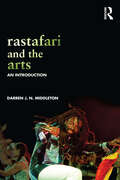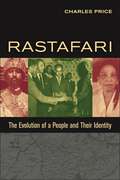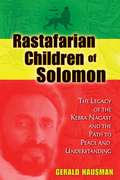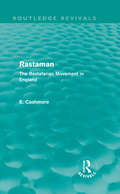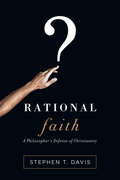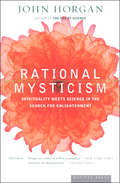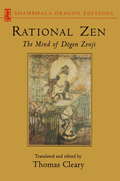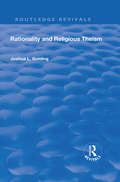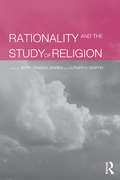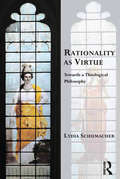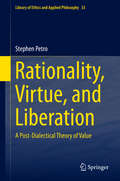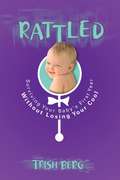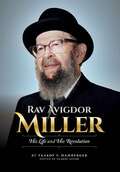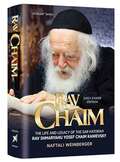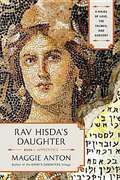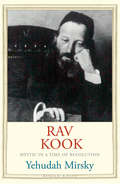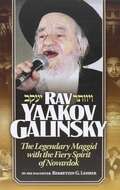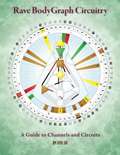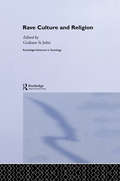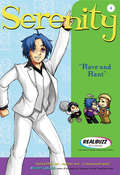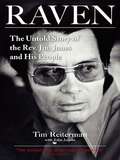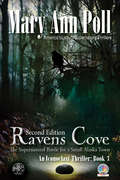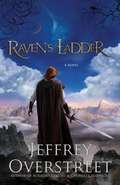- Table View
- List View
Rastafari and the Arts: An Introduction
by Darren J. MiddletonDrawing on literary, musical, and visual representations of and by Rastafari, Darren J. N. Middleton provides an introduction to Rasta through the arts, broadly conceived. The religious underpinnings of the Rasta movement are often overshadowed by Rasta’s association with reggae music, dub, and performance poetry. Rastafari and the Arts: An Introduction takes a fresh view of Rasta, considering the relationship between the artistic and religious dimensions of the movement in depth. Middleton’s analysis complements current introductions to Afro-Caribbean religions and offers an engaging example of the role of popular culture in illuminating the beliefs and practices of emerging religions. Recognizing that outsiders as well as insiders have shaped the Rasta movement since its modest beginnings in Jamaica, Middleton includes interviews with members of both groups, including: Ejay Khan, Barbara Makeda Blake Hannah, Geoffrey Philp, Asante Amen, Reggae Rajahs, Benjamin Zephaniah, Monica Haim, Blakk Rasta, Rocky Dawuni, and Marvin D. Sterling.
Rastafari: The Evolution of a People and Their Identity
by Charles PriceIlluminates how the Rastafari movement managed to evolve in the face of severe biases Misunderstood, misappropriated, belittled: though the Rastafari feature frequently in media and culture, they have most often been misrepresented, their political and religious significance minimized. But they have not been vanquished.Charles Price’s Rastafari: The Evolution of a People and Their Identity reclaims the rich history of this relatively new world religion. Charting its humble and rebellious roots in Jamaica’s backcountry in the late nineteenth century to the present day, Price explains how Jamaicans’ obsession with the Rastafari wavered from campaigns of violence to appeasement and cooptation. Indeed, he argues that the Rastafari as a political, religious, and cultural movement survived the biases and violence they faced through their race consciousness and uncanny ability to ride the waves of anti-colonialism and Black Power. This social movement traveled throughout the Caribbean, Africa, Central America, and the United States, capturing the heart and imagination of much of the African diaspora. Rastafari spans the movement’s struggle for autonomy, its multiple campaigns for repatriation to Africa, and its leading role in the Black consciousness movements of the twentieth century. Not satisfied with simply narrating the past, Rastafari also takes on the challenges of gender equality and the commodification of Rastafari culture in the twenty-first century without abandoning its message of equality and empowering the downpressed. Rastafari shows how this cultural and political context helped to shape the development of a Black collective identity, demonstrating how Rastafarians confronted society-wide ridicule and oppression and emerged prouder and more united, steadfast in their conviction that they were a chosen people.
Rastafarian Children of Solomon: The Legacy of the Kebra Nagast and the Path to Peace and Understanding
by Gerald HausmanShares the spiritual wisdom of Rastafari through the stories, teachings, and traditions of practicing Rastas in Jamaica • Includes the author’s interviews with bush doctors, healers, and Rastafarians gathered during his 15 years of living in Jamaica • Reveals the old ways of the Rastafarians and how their beliefs form an unbroken lineage tracing back to King Solomon • Explains the connection of Rasta beliefs to important biblical passages Tracing their lineage back to King Solomon--the wisest man who ever lived--Rastafarians follow a spiritual tradition of peace and meditation that is more a way of life than an organized religion. During his 15 years living in Jamaica, Gerald Hausman developed deep friendships with Rastafarians and rootsmen, enabling him to experience firsthand the beliefs and traditions of these followers of the Kebra Nagast--the African gospel excised from the King James version of the Bible. He met bush doctors, Rasta preachers, members of the Marley family, and respected elders who knew Marcus Garvey, prophet of the Rasta movement and vocal proponent of the Pan-African movement in America. He also met elders who were present when Haile Selassie I, Emperor of Ethiopia and descendant of the House of David, came to Jamaica in the 1960s. Through interviews with fishermen, mystics, and wise men, as well as direct encounters with spirits and the spiritual, the author reveals the deep wisdom that underlies the “old ways” of the Rastas. He connects their stories, lives, and teachings with important biblical passages as well as reggae songs. He shares their views on the medicinal and meditative powers of cannabis--the sacred herb of Solomon--and explains that while Rastas believe it to be “the opener of the door,” they maintain that peace and understanding must be found within. Illustrating the unwavering faith and hope of the Rastafari of Jamaica, Hausman shows them to be a people who, above all, emphasize equality, because the Holy Spirit within each of us makes us all one and the same.
Rastaman: The Rastafarian Movement in England (Routledge Revivals)
by E. CashmoreFirst published in 1979, this book makes a detailed study of Rastafarianism. It traces the expansion of Rastafarian culture from its origins and development in Jamaica through to the growth of Rastafarian life in Britain. It looks at Rastafarian culture in England in the late 1970s based on the author’s intimate experiences and communications with followers of the movement.
Rational Faith: A Philosopher's Defense of Christianity (Veritas Books)
by Stephen T. DavisWhy believe in God?
Rational Mysticism: Spirituality Meets Science in the Search for Enlightenment
by John HorganIn Rational Mysticism, acclaimed journalist John Horgan embarks on an adventure of discovery, investigating the ways in which scientists, theologians, and philosophers are attempting to formulate an empirical explanation of spiritual enlightenment. Horgan visits and interviews a fascinating Who's Who of experts, including theologian Huston Smith; Andrew Newberg, explorer of the brain's "God module"; Ken Wilber, a transpersonal psychologist and Buddhist; psychedelic pharmacologist Alexander Shulgin; Oxford-educated psychologist and Zen practitioner Susan Blackmore; and postmodern shaman Terence McKenna. Horgan also explores the effects of reputed enlightenment-inducing techniques such as fasting, meditation, prayer, sensory deprivation, and drug trips. In his lively and thought-provoking inquiry, Horgan finds surprising connections among seemingly disparate disciplines, not the least of which is a shared awe of the nature of the universe.
Rational Zen: The Mind of Dogen Zenji
by Thomas ClearyZen has often been portrayed as being illogical and mystifying, even aimed at the destruction of the rational intellect. These new translations of the thirteenth-century Zen master Dogen--one of most original and important Zen writers--illustrate the rational side of Zen, which has been obscured through the centuries, tainting people's understanding of it. Rational Zen consists of enlightening selections from Dogen's two masterworks, "Treasury of Eyes of True Teaching" (the famed Shobogenzo, Japan's most sophisticated philosophical work) and "Universal Book of Eternal Peace," which until now has been unavailable in English. The translator also provides explanations of the inner meanings of Dogen's writings and sayings--the first commentaries of their kind of English. A compendium of authentic source materials further enhances the reader's insight into Dogen's methods, linking them to the great classical traditions of Buddhism that ultimately flowered in Zen.
Rationality and Religious Theism (Routledge Revivals Ser.)
by Joshua L. GoldingThroughout the ages one of the central topics in philosophy of religion has been the rationality of theistic belief. This book proposes that parties on both sides of this debate might shift their attention in a different direction, by focusing on the question of whether it is rational to be a religious theist. Explaining that having theistic beliefs is primarily a cognitive affair but being a religious theist involves a whole way of life that includes one's beliefs, Golding argues that it can be pragmatically rational to be a religious theist even if the evidence for God’s existence is minimal. The argument is applied to the case of Judaism, articulating what is involved in religious Judaism and arguing that it is rationally defensible to be a religious Jew. The book concludes with a discussion of whether a similar argument might be constructed for other versions of religious theism such as Christianity or Islam, and for non-theistic religions such as Taoism or Buddhism. Joshua Golding offers a carefully wrought explanation of how it can be rational for someone to live a religious life, in particular (but not necessarily only), a traditional Jewish life.
Rationality and the Study of Religion (Acta Jutlandica Ser. #72.1)
by Jeppe Sinding Jensen & Luther H. MartinDoes rationality, the intellectual bedrock of all science, apply to the study of religion?Religion, arguably the most subjective area of human behaviour, has particular challenges associated with its study. Attracting crowd-healers, conjurers, the pious and the prophetic alongside comparativists and sceptics, it excites opinions and generalizations whilst seldom explicitly staking out the territory for the discussions in which it partakes. Increasingly, scholars argue that religious study needs to define and critique its own field, and to distinguish itself from theology and other non-objective disciplines. Yet how can rational techniques be applied to beliefs and states of mind regarded by some as beyond the scope of human reason? Can these be made empirically testable, or comparable and replicable within academic communities? Can science explicate religion without reducing it to mere superstition, or redefine its truth in some empirical but meaningful way? Featuring contributions from leading international experts including Donald Wiebe, Roger Trigg and Michael Pye, Rationality and the Study of Religion gets under the surface of the religious studies discipline to expose the ideologies beneath. Reopening debate in a neglected yet philosophically significant field, it questions the role of rationality in religious anthropology, natural history and anti-scientific theologies, with implications not only for supposedly objective disciplines but for our deepest attitudes to personal experience. 'Interesting and important. Religion has long been associated with irrationality, both by its defenders and its critics, and the topic of rationality has been unjustly neglected The book certainly deserves to be widely circulated.'Greg Alles, Western Maryland College
Rationality as Virtue: Towards a Theological Philosophy (Transcending Boundaries in Philosophy and Theology)
by Lydia SchumacherFor much of the modern period, theologians and philosophers of religion have struggled with the problem of proving that it is rational to believe in God. Drawing on the thought of Thomas Aquinas, this book lays the foundation for an innovative effort to overturn the longstanding problem of proving faith's rationality, and to establish instead that rationality requires to be explained by appeals to faith. To this end, Schumacher advances the constructive argument that rationality is not only an epistemological question concerning the soundness of human thoughts, which she defines in terms of ’intellectual virtue’. Ultimately, it is an ethical question whether knowledge is used in ways that promote an individual's own flourishing and that of others. That is to say, rationality in its paradigmatic form is a matter of moral virtue, which should nonetheless entail intellectual virtue. This conclusion sets the stage for Schumacher's argument in a companion book, Theological Philosophy, which explains how Christian faith provides an exceptionally robust rationale for rationality, so construed, and is intrinsically rational in that sense.
Rationality, Virtue, and Liberation
by Stephen PetroThis book explores the overlooked but vital theoretical relationships between R. M. Hare, Alan Gewirth, and Jürgen Habermas. The author claims their accounts of value, while failing to address classic virtue-theoretical critiques, bear the seeds of a resolution to the ultimate question "What is most valuable?" These dialectical approaches, as claimed, justify a reinterpretation of value and value judgment according to the Carnapian conception of an empirical-linguistic framework or grammar. Through a further synthesis with the work of Philippa Foot and Thomas Magnell, the author shows that "value" would be literally meaningless without four fundamental phenomena which constitute such a framework: Logical Judgment, Conceptual Synthesis, Conceptual Abstraction, and Freedom. As part of the 'grammar of goodness,' the excellence of these phenomena, in a highly concrete way, constitute the essence of the greatest good, as this book explains.
Rattled: Surviving Your Baby's First Year Without Losing Your Cool
by Trish BergWelcome to the Adventure of MotherhoodClutter? Chaos? Exhaustion got you down? You must be a mom. And you're not alone. Perhaps you thought you had it all together...then your baby was born and your world was turned upside down. If new motherhood has you filled with doubt, guilt, and confusion, Trish Berg wants to offer companionship, hope, and help-plus a lot of humor along the way.With practical advice and scriptural reminders, Berg presents two pillars of motherhood: Keep it simple and keep it biblical. Relax as you learn that every mom shares your stresses, challenges, and "Aagghh!" moments. In the midst of sleep deprivation and Cheerio dust, you'll learn to savor the simple joy and privilege of mothering.From the Trade Paperback edition.
Rav Avigdor Miller - His Life and His Revolution
by Rabbi Yaakov Y. Hamburger''Baruch Hashem, ich gei mit epes -- Thank G-d, I'm leaving with something.'' The ''something'' that Rav Avigdor Miller left with when he passed away on 27 Nissan 5761 (2001) was a radically transformed Torah world -- a world he helped revolutionize. Surprisingly, he did so without almost ever leaving the confines of his little shul in Brooklyn. Despite being born in early twentieth century America, attending public school, and growing up in an environment focused solely on materialism and assimilation, Rav Miller somehow managed to resist the powerful tides of his youth. The path of Divine providence -- a reflection of his own determination to serve Hashem with all his heart -- took him to the Yeshivah Eitz Chaim in New York, to the legendary Slabodka yeshivah in Europe, to Chelsea, Massachusetts, to serve as Rav, to Mesivta Rabbeinu Chaim Berlin as Mashgiach, and finally to East Flatbush and later Flatbush as the Rav of a small kehillah (congregation). Along that path, he never stopped working on himself, and he never stopped learning and teaching Torah. One thought at a time, one small action at a time, Rav Miller transformed himself into a supreme even Hashem (servant of G-d). One word at a time, one shiur (class) at a time, Rav Miller transformed virtually every Jew who came in contact with him. His mind-expanding, eye-opening Thursday night lectures -- disseminated around the world through his tape recordings -- changed the lives of Jews everywhere. His patient, methodical Gemara shiurim (Talmud classes) turned those who at first could only read from a siddur (prayer book) into accomplished talmidei chachamim (Torah scholars). His numerous published books enriched readers with the gift of refreshing clarity as they conveyed hard-hitting, no-nonsense Torah hashkafah (outlook). The story of Rav Miller's life -- presented here for the first time in a fascinating, comprehensive biography -- is a testimony to the power we all have to transform ourselves, and our world.
Rav Chaim The Life and Legacy of the Sar HaTorah Rav Shmaryahu Yosef Chaim Kanievsky
by Naftali WeinbergerRav Chaim Kanievsky was the Sar HaTorah, master of every area of Torah knowledge and author of dozens of Torah works on topics ranging from the basic to the arcane. He was a fount of guidance, comfort, and blessing to tens of thousands. His diligence in Torah was legendary, yet he opened his home and his heart to all who sought him. But despite all the stories we have heard, there is so much more. And Rabbi Naftali Weinberger is the perfect person to give us the rest of the story. Rabbi Weinberger has had a uniquely close relationship with Rav Chaim Kanievsky and his family for nearly thirty years — so much so that Rav Chaim authorized him to write the bestselling biography Rebbetzin Kanievsky. His unparalleled access to Rav Chaim and his family enabled him to produce this fascinating biography, giving us an insider’s view of the Sar HaTorah’s remarkable life and achievements, including warm and personal stories heard directly from the family and rare photographs appearing in print for the very first time. In these pages, we will come know the Torah aristocracy that was Rav Chaim’s family — the Chazon Ish, the Steipler, Rav Elyashiv, and others — from the family’s unique perspective. We will encounter the Torah giants and “simple” Jews who were part of Rav Chaim’s life, and see how he interacted with them. The Prince of Torah gave our People so much in his lifetime, and through this extraordinary volume his memory and example will continue to inspire us. We will aspire to emulate his diligence and love for Torah, his shalom bayis, and the chinuch he instilled in his family. We will learn to care for and welcome every Jew. And we will see how a Torah giant who valued every moment of Torah study freely gave of his time for others.
Rav Hisda's Daughter, Book I: Apprentice
by Maggie AntonHisdadukh, blessed to be beautiful and learned, is the youngest child of Talmudic sage Rav Hisda. The world around her is full of conflict. Rome, fast becoming Christian, battles Zoroastrian Persia for dominance while Rav Hisda and his colleagues struggle to establish new Jewish traditions after the destruction of Jerusalem's Holy Temple. Against this backdrop Hisdadukh embarks on the tortuous path to become an enchantress in the very land where the word 'magic' originated. But the conflict affecting Hisdadukh most intimately arises when her father brings his two best students before her, a mere child, and asks her which one she will marry. Astonishingly, the girl replies, "Both of them." Soon she marries the older student, although it becomes clear that the younger one has not lost interest in her. When her new-found happiness is derailed by a series of tragedies, a grieving Hisdadukh must decide if she does, indeed, wish to become a sorceress. Based on actual Talmud texts and populated with its rabbis and their families, Rav Hisda's Daughter: Book I - Apprentice brings the world of the Talmud to life - from a woman's perspective. Praise for the Rashi's Daughters trilogy: "Anton delivers a tour de force." --Library Journal "A compelling combination of drama, suspense, and romance." --Lilith magazine
Rav Kook
by Yehudah MirskyRav Abraham Isaac Kook (1865-1935) was one of the most influential--and controversial--rabbis of the twentieth century. A visionary writer and outstanding rabbinic leader, Kook was a philosopher, mystic, poet, jurist, communal leader, and veritable saint. The first chief rabbi of Jewish Palestine and the founding theologian of religious Zionism, he struggled to understand and shape his revolutionary times. His life and writings resonate with the defining tensions of Jewish life and thought.A powerfully original thinker, Rav Kook combined strict traditionalism and an embrace of modernity, Orthodoxy and tolerance, piety and audacity, scholasticism and ecstasy, and passionate nationalism with profound universalism. Though little known in the English-speaking world, his life and teachings are essential to understanding current Israeli politics, contemporary Jewish spirituality, and modern Jewish thought. This biography, the first in English in more than half a century, offers a rich and insightful portrait of the man and his complex legacy. Yehudah Mirsky clears away widespread misunderstandings of Kook's ideas and provides fresh insights into his personality and worldview. Mirsky demonstrates how Kook's richly erudite, dazzlingly poetic writings convey a breathtaking vision in which "the old will become new, and the new will become holy."
Rav Yaakov Galinsky - The Legendary Maggid with the Fiery Spirit of Novardik
by Rebbetzin G. LehrerFrom his earliest years to his final days, Rav Yaakov Galinsky zt l lived a life of rock-solid faith and complete trust in HaShem. From his childhood in Krinik to yeshivah in Novardok, from exile in Siberia to starvation in Kazakhstan, from torture in prison to the German DP camps, and finally to Eretz Yisroel where he established yeshivos and kollelim, inspiring thousands along the way here is the fascinating and powerful story of this legendary Maggid. Told as only a devoted daughter can, Rebbetzin G. Lehrer lovingly recounts the story of her illustrious father his mesiras nefesh for Torah, mitzvos, and fellow Jews. Filled with wit, wisdom, and over 130 photographs, this unforgettable biography shines with warmth and inspiration on each and every page.
Rave Bodygraph Circuitry
by Ra Uru HuRave Bodygraph Circuitry is an in-depth journey through the Circuits and Channels. It illustrates the connections between Circuit Groups, Circuits, and Channels. The book also describes each Channel and how the Gates relate to it, and ties the way the Channels work into the fundamental functionality of the Types. Unlike the Circuitry Book, which explains each Gate and Channel as an isolated element, this book describes how Gates, Channels, Circuits, Circuit Groups, and Types are interconnected.
Rave Culture and Religion (Routledge Advances in Sociology #Vol. 8)
by Graham St JohnThe collection provides insights on developments in post-traditional religiosity (especially 'New Age' and 'Neo-Paganism') through studies of rave's Gnostic narratives of ascensionism and re-enchantment, explorations of the embodied spirituality and millennialist predispositions of dance culture, and investigations of transnational digital-art countercultures manifesting at geographic locations as diverse as Goa, India, and Nevada's Burning Man festival. Contributors examine raving as a new religious or revitalization movement; a powerful locus of sacrifice and transgression; a lived bodily experience; a practice comparable with world entheogenic rituals; and as evidencing a new Orientalism. Rave Culture and Religion will be essential reading for advanced students and academics in the fields of sociology, cultural studies and religious studies.
Rave-n-Rant
by Realbuzz StudiosSerenity finds out the hard way what happens at all night raves...doesn't always stay there.Escaping work, Serenity parties all night at a rave. But the rave turns into a rant when an intimate conversation reveals some frank truths. And when she realizes her friends may not actually even like her--things really come to a head. It's all about love in this all-new adventure.
Raven: The Untold Story of the Rev. Jim Jones and His People
by Tim ReitermanThe basis for the upcoming HBO miniseries and the "definitive account of the Jonestown massacre" (Rolling Stone) -- now available for the first time in paperback. Tim Reiterman’s Raven provides the seminal history of the Rev. Jim Jones, the Peoples Temple, and the murderous ordeal at Jonestown in 1978. This PEN Award–winning work explores the ideals-gone-wrong, the intrigue, and the grim realities behind the Peoples Temple and its implosion in the jungle of South America. Reiterman’s reportage clarifies enduring misperceptions of the character and motives of Jim Jones, the reasons why people followed him, and the important truth that many of those who perished at Jonestown were victims of mass murder rather than suicide.This widely sought work is restored to print after many years with a new preface by the author, as well as the more than sixty-five rare photographs from the original volume.
Ravens Cove: The Supernatural Battle for a Small Alaska Town
by Mary Ann PollWelcome to Ravens Cove, Alaska, a tiny town nestled in a small hollow on the majestic Cook Inlet. A town familiar with storytelling—after all, Alaska abounds in rich legends. In Ravens Cove, though, legends have a tendency to come to life. Meet Josiah Williams, the peculiar stranger whose warning to lifetime residents Kat Tovslosky and her cousin, Sheriff Bart Andersen, raises more questions than answers; a man whose dark past and knowledge of the murders make him a suspect more than an ally. Join Kat and Bart as an unlikely troop forms (including an unwelcome FBI agent) to discover the identity of a killer. The unearthing of which will throw the reluctant warriors into a battle for their very lives and the lives of all who call Ravens Cove home.
Raven’s Ladder: A Novel
by Jeffrey OverstreetA DEADLY MENACE IS BREAKING THROUGH THE GROUND. THE PEOPLE OF ABASCAR MUST ABANDON THEIR STONE REFUGE AND FLEE INTO VULNERABILITY IN THE FOREST. BUT THEIR KING HAS HAD A VISIONhellip; Following the beacon of Auralia’s colors and the footsteps of a mysterious dream-creature, King Cal-raven has discovered a destination for his weary crowd of refugees. It’s a city only imagined in legendary tales. And it gives him hope to establish New Abascar. But when Cal-raven is waylaid by fortune hunters, his people become vulnerable to a danger more powerful than the prowling beastmen––House Bel Amica. In this oceanside kingdom of wealth, enchantment, and beauty, deceitful Seers are all too eager to ensnare House Abascar’s wandering throng. Even worse, the Bel Amicans have discovered Auralia’s colors, and are twisting a language of faith into a lie of corruption and control. If there is any hope for the people of Abascar, it lies in the courage of Cyndere, daughter of Bel Amica’s queen; the strength of Jordam the beastman; and the fiery gifts of the ale boy, who is devising a rescue for prisoners of the savage Cent Regus beastmen. As his faith suffers one devastating blow after another, Cal-raven’s journey is a perilous climb from despair to a faint gleam of hope––the vision he sees in Auralia’s colors.
Raw Edges
by Sandra D. BrickerGrayson McDonough has no use for teal ribbons, 5k runs, or ovarian cancer support groups now that his beautiful wife Jenna is gone. But their nine-year-old daughter Sadie seems to need the connection. When Annabelle Curtis, the beautiful cancer survivor organizing the memory quilt project for the Ovacome support group, begins to bring out the silly and fun side of his precious daughter again, Gray must set aside his own grief to support the healing of Sadie's young heart. But is there hope for Gray's heart too along the way?
Raw Edges
by Sandra D. BrickerGrayson McDonough has no use for teal ribbons, 5k runs, or ovarian cancer support groups now that his beautiful wife Jenna is gone. But their nine-year-old daughter Sadie seems to need the connection. When Annabelle Curtis, the beautiful cancer survivor organizing the memory quilt project for the Ovacome support group, begins to bring out the silly and fun side of his precious daughter again, Gray must set aside his own grief to support the healing of Sadie's young heart. But is there hope for Gray's heart too along the way?
